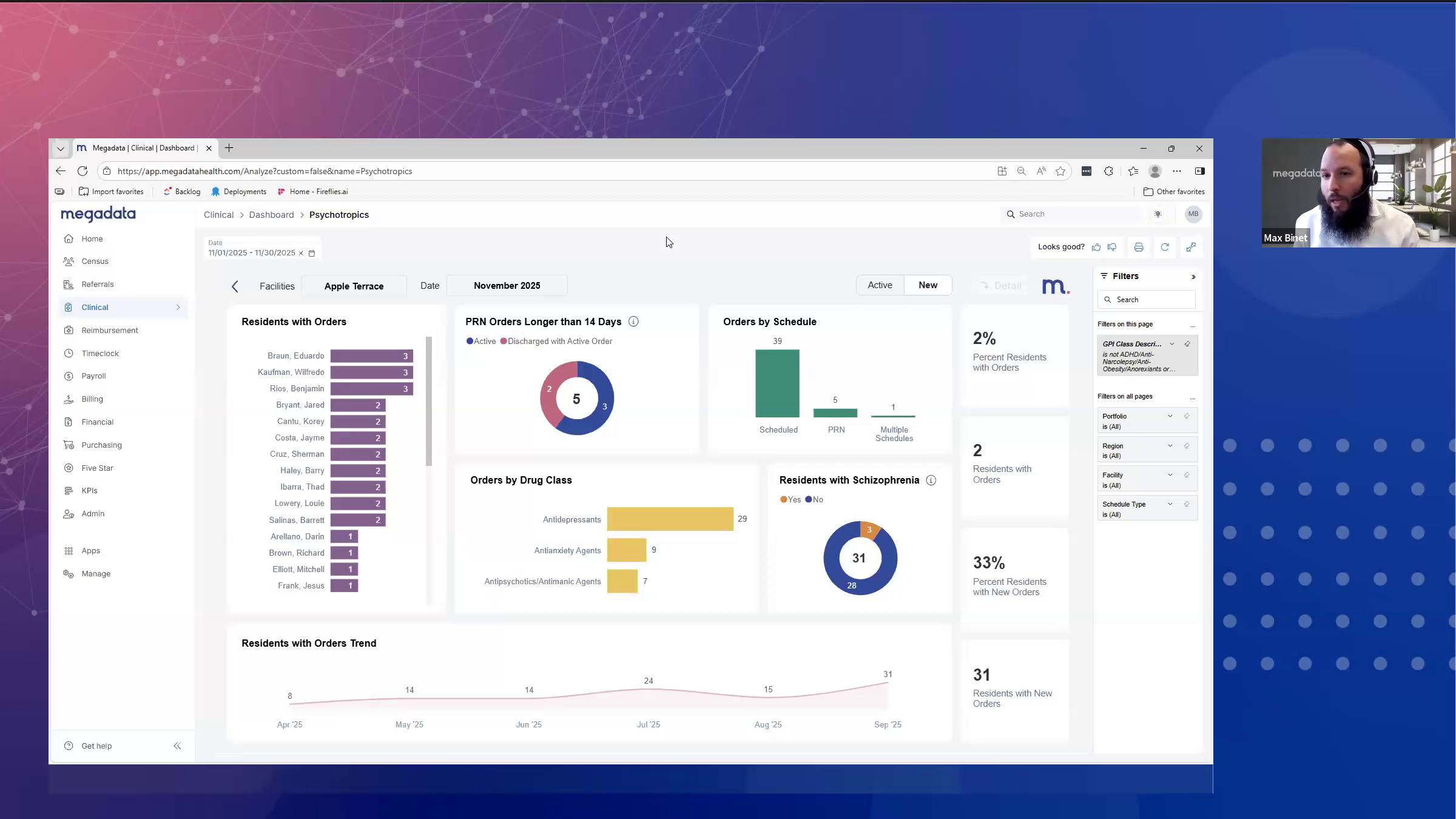Clinical
Everybody Wins: Rehospitalization Analysis in Long-Term Care

In the complex ecosystem of long-term care, rehospitalizations not only signify a setback in a patient's health but also have profound implications on the operational and financial aspects of nursing homes.
With the Centers for Medicare & Medicaid Services (CMS) using rehospitalization rates as a key metric to determine reimbursement, the stakes have never been higher for skilled nursing facilities (SNFs) and assisted living facilities (ALFs).
Using a data analytics tool to dive into the underlying data that shapes a facility’s rehospitalization rate can provide insights into clinical or operational improvements with big impacts.
The Significance of Rehospitalization Rates
Slight fluctuations in rehospitalization rates can ripple through the financial stability of long-term care facilities and their hospital partners. Under CMS regulations, both Medicare and Medicaid reimbursements are closely tied to these rates.
The reasons behind rehospitalizations are multifaceted, ranging from premature hospital discharges to the resurfacing of a natural illness. Identifying the root causes, especially across multiple facilities, presents a daunting challenge that long term care data analytics is adeptly suited to address.
For example, a recent study found that tracking the timeliness of physician visits after a resident enters the nursing home has a surprising impact on 14-day rehospitalization rates:
Researchers found that patients who received clinical assessments from physicians or APPs shortly after their admission to SNFs (within 1 day) were less likely to experience rehospitalization compared to those whose evaluations were delayed until after 2 days.
Source: Skilled Nursing News, Timely Physician, Skilled Clinician Visits Reduce Rehospitalization Risk in Older Adults in Nursing Homes, Shelby Grebbin, Oct. 12, 2023 (https://skillednursingnews.com/2023/10/timely-physician-skilled-clinicianvisits-reduce-rehospitalization-risk-in-older-adults-in-nursing-homes/)

Using a Long-Term Care Data Analytics Platform (like Megadata)
By seamlessly integrating with existing Electronic Health Records (EHR) systems, long-term care data analytics can synthesize vital data into user-friendly dashboards and reports. This integration facilitates a deep dive into both macro trends and granular details, enabling facility operators to pinpoint and tackle adverse rehospitalization trends.
A case in point is a scenario where a VP of Clinical, leveraging Megadata's Real-Time Health (RTH) dashboard, unearthed a spike in rehospitalizations at a facility with great historical rehospitalization performance. After connecting with the DON at that facility, they were able to link one physician's weekend admissions to the spike in the rehospitalization rate.
This discovery led to an optimized Care in Place protocol, significantly reducing unnecessary hospital transfers. By easily visualizing the trend in rehospitalizations and quickly drilling down into the details, the facility was able to address their spike in rehospitalizations in a data-backed way.
Benefits for Patients
By facilitating a deeper understanding of rehospitalization trends, long-term care data analytics enables nursing homes to optimize In Place treatments. This approach minimizes the disruption and discomfort of hospital readmissions, ensuring patients receive consistent and familiar care within the nursing home setting, ultimately leading to improved health outcomes.
Operational, Financial, and Clinical Advantages for Facilities
The advantages of employing deep rehospitalization analysis extend well beyond patient care. Operationally, facilities gain unparalleled visibility into the data underpinning shifts in rehospitalization trends, empowering decision-makers to enact targeted improvements.
Financially, every decrement in rehospitalization rates translates to enhanced Medicare and Medicaid reimbursements, bolstering the economic health of the facility.
Clinically, reduced rehospitalizations mean uninterrupted care for residents, fostering better health outcomes and elevating the facility's quality metrics.
Impact on the Healthcare System
The ripple effect of successful rehospitalization analysis is felt across the healthcare continuum. Hospitals, witnessing lower rehospitalization rates from partnering nursing homes, can place greater trust in these facilities for patient care post-discharge.
Similarly to nursing homes, improved rehospitalization rates lead to improved reimbursement rates for hospitals, creating a virtuous cycle of trust and collaboration.
Some skilled nursing facilities are creating specialized care units within the nursing home, such as pulmonary or cardiovascular departments, as a direct response to the insights gleaned from rehospitalization analytics, further lowering rehospitalization rates and enhancing patient care.
Megadata, The Leading Long-Term Care Data Analytics Platform
The integration of Megadata into a facility's existing systems is a streamlined process. Once operational, the platform provides real-time data insights into Census, Clinical, Reimbursement, Labor Management, and, of course, rehospitalizations.
Users with the correct access level can delve into the Hospital Transfer dashboard to analyze facility-specific rehospitalization data, even setting up automated email reports to keep rehospitalizations front of mind.

Future Directions and Innovations
Megadata is committed to continually improving visibility into key performance metrics relating to rehospitalization and beyond.
The recent launch of the Metrics dashboard on the Megadata Mobile App is a testament to this, offering long-term care leaders instant access to crucial KPIs, including rehospitalization metrics, at their fingertips. This continuous evolution of features ensures that Megadata remains at the forefront of long-term care data analytics, ready to meet new industry challenges, regulations, and performance hurdles.
Conclusion
Megadata's data analytics platform represents a paradigm shift in how long-term care facilities approach rehospitalization analysis.
By offering real-time, actionable insights, Megadata not only enhances patient care but also provides operational, financial, and clinical benefits to SNFs and ALFs. The broader healthcare system, too, stands to gain from this collaborative approach to reducing rehospitalizations.
In the end, Megadata's platform creates a win-win-win scenario: better outcomes for patients, improved operational efficiency for facilities, and a more resilient healthcare ecosystem.
Want to see first-hand how Megadata could help your organization view rehospitalization data? Book a call today!












